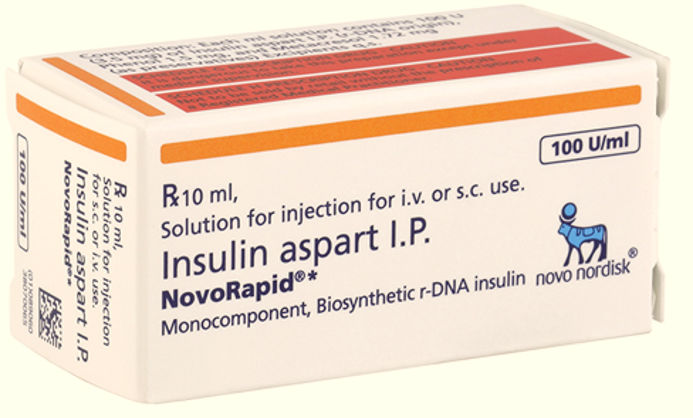- Home
- Health Condition
Medicine For Insulin Resistance
Medicine For Insulin Resistance
- Total Items (8)
 RX
RXNovomix 30 100IU/ml Flexpen 3 ml
₹1041.80
MRP ₹1157.50
10% off
 RX
RXNovorapid 100IU/ml Flexpen 3 ml
₹1018.60
MRP ₹1157.50
12% off
 RX
RXNovorapid 100IU/ml Penfill 3 ml
₹843.30
MRP ₹937
10% off
 RX
RXNovomix 30 100IU/ml Penfill 3 ml
₹843.30
MRP ₹937
10% off
 RX
RXNovorapid 100IU Injection 10 ml
₹2297.70
MRP ₹2553
10% off
 RX
RXNovarapid Penfil 100 mg Injection 1's
₹696.60
MRP ₹774
10% off
 RX
RXInsupen Blue
₹607.50
MRP ₹675
10% off
 RX
RXInsupen Gold
₹607.50
MRP ₹675
10% off
Medicine for Insulin Resistance
Insulin resistance is a common condition in which the body's cells become less responsive to the hormone insulin, leading to higher glucose (sugar) levels in the bloodstream. It is often a precursor to Type 2 diabetes and can significantly impact overall health if left untreated. Insulin resistance is typically associated with obesity, physical inactivity, and poor dietary habits. It can also be affected by genetic factors, age, and certain medical conditions.
Types of Medicines Used for Insulin Resistance
There are several categories of medications that can help manage insulin resistance. These medications improve the body's ability to respond to insulin, lower blood sugar levels, and address other factors contributing to the condition, such as inflammation and fat accumulation. Below are the main types of medicine for insulin resistance:
- Metformin: Metformin is the most commonly prescribed medication for insulin resistance. It reduces the amount of sugar produced by the liver and makes the body's cells more sensitive to insulin. It is often used as the first-line treatment and is considered safe and effective.
- Thiazolidinediones (TZDs): Thiazolidinediones, such as pioglitazone and rosiglitazone, help the body use insulin more effectively by targeting fat cells and improving insulin sensitivity. These medications are particularly useful in treating patients with Type 2 diabetes who also have insulin resistance. However, they may come with side effects, such as weight gain and fluid retention, which need to be carefully managed.
- Sulfonylureas: Sulfonylureas, including glimepiride and glipizide, stimulate the pancreas to produce more insulin. Although they can help manage blood sugar levels, they are typically used when other medications, like metformin, are not enough to control insulin resistance.
- DPP-4 Inhibitors: Dipeptidyl peptidase-4 (DPP-4) inhibitors, such as sitagliptin and vildagliptin, help the body produce more insulin in response to meals. These drugs work by inhibiting the enzyme DPP-4, which breaks down incretin hormones that help regulate blood sugar levels. DPP-4 inhibitors are generally well-tolerated and can be combined with other medications for better blood sugar control.
- GLP-1 Agonists: Glucagon-like peptide-1 (GLP-1) agonists, including liraglutide and semaglutide, mimic the action of GLP-1, a hormone that stimulates insulin release and reduces appetite. These medications can help control blood sugar levels and promote weight loss, making them a good choice for individuals with both insulin resistance and obesity.
- SGLT2 Inhibitors: Sodium-glucose co-transporter-2 (SGLT2) inhibitors, such as empagliflozin and canagliflozin, help the kidneys remove excess glucose from the bloodstream through urine. These medications are often used in combination with other diabetes drugs to lower blood sugar and have been shown to reduce the risk of cardiovascular disease in patients with insulin resistance.
Benefits of Using Medicines for Insulin Resistance
The primary goal of using medicine for insulin resistance is to manage blood sugar levels and prevent the development of Type 2 diabetes. Below are some of the key benefits of using medicines to manage insulin resistance:
- Improved Blood Sugar Control: The main benefit of insulin resistance medications is that they help reduce blood sugar levels by enhancing insulin sensitivity or increasing insulin production. This can help patients avoid hyperglycemia (high blood sugar) and its associated complications.
- Prevention of Type 2 Diabetes: If left unmanaged, insulin resistance can lead to Type 2 diabetes. Medications that improve insulin sensitivity can help prevent or delay the onset of diabetes in patients at high risk.
- Reduced Risk of Cardiovascular Diseases: Some medications, such as SGLT2 inhibitors, have been shown to reduce the risk of heart disease and stroke in patients with insulin resistance, particularly those with coexisting conditions like hypertension or high cholesterol.
- Weight Loss: Certain medications, like GLP-1 agonists, can aid in weight loss, which is particularly beneficial for individuals with obesity-related insulin resistance. Losing weight can further improve insulin sensitivity and reduce the risk of developing Type 2 diabetes.
- Improved Quality of Life: These medications can improve the overall health and quality of life of individuals with insulin resistance by controlling blood sugar levels and reducing complications associated with the condition.
Dosage & Usage Instructions of Medicines for Insulin Resistance
The dosage and usage instructions for medications used to manage insulin resistance vary depending on the type of medicine prescribed. It is important for patients to follow their healthcare provider's instructions carefully to achieve optimal results and minimise the risk of side effects.
- Metformin: Typically taken once or twice daily with meals. The dosage starts low and is gradually increased to minimise gastrointestinal side effects.
- Thiazolidinediones (TZDs): These are usually taken once daily. Dosage may vary based on the specific medication and patient response.
- Sulfonylureas: Taken once or twice daily, usually before meals. The dosage is adjusted based on blood sugar levels.
- DPP-4 Inhibitors: These are typically taken once daily, with or without food.
- GLP-1 Agonists: These may be taken as a daily or weekly injection, depending on the specific drug. Patients should receive training on how to administer the injection properly.
- SGLT2 Inhibitors: Typically taken once daily, with or without food.
Patients should also monitor their blood sugar levels regularly, as prescribed, and inform their healthcare provider of any changes in their condition or side effects.
Buy Medicines for Insulin Resistance Online at Apollo 24|7
If you're looking for high-quality medicines for insulin resistance, Apollo 24|7 offers a convenient online platform where you can browse, purchase, and have them delivered to your doorstep. Apollo Pharmacy provides a wide range of medicine for insulin resistance, along with professional guidance from pharmacists and healthcare experts.
Frequently asked questions
Insulin resistance occurs when the body's cells do not respond effectively to insulin, leading to high blood sugar levels. It is often a precursor to Type 2 diabetes.
Lifestyle changes, such as regular exercise, a healthy diet, and medications, can manage and, in some cases, reverse insulin resistance.
The most common medications for insulin resistance include metformin, thiazolidinediones, sulfonylureas, DPP-4 inhibitors, GLP-1 agonists, and SGLT2 inhibitors.
Yes, some medications may have side effects, such as gastrointestinal upset, weight gain, or fluid retention. It's important to discuss these with your healthcare provider.
Yes, you can buy medications for insulin resistance online at trusted pharmacies like Apollo 24|7, ensuring quality and timely delivery.
